#linguistics posting
Explore tagged Tumblr posts
Text

#so true bestie#linguistics posting#meme#memes#lol#lmao#dank memes#humor#humour#relatable#relatable meme#relatable memes#funny meme#funny thoughts#memedaddy#stolen meme#stolen memes#meme dump
67 notes
·
View notes
Text
I keep using the word "sans" as a verb meaning "to take" (to make the subject without) but this is not an accepted meaning of the word, so.
18 notes
·
View notes
Text
the slide to type feature on iphones is the physical equivalent of schwa
28 notes
·
View notes
Note
The English alphabet
Propaganda: it’s not complete unless there’s T
Anti-propaganda: It’s also not complete unless there’s E
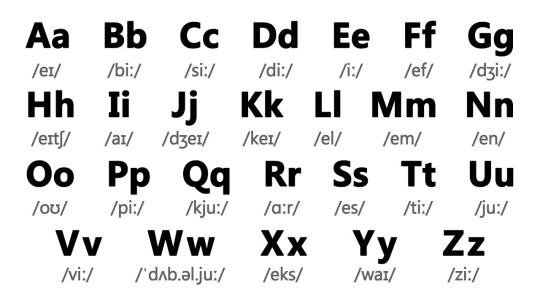
Submitted by: Anon
For both the propaganda and Anti-Propaganda, I have added a very unique last poll option, for a very unique Blorbo
#the english alphabet#linguistics#linguistics posting#linguistics humor#english language#Could T Have Saved Him#transgender#trans men#transmasc#transmasculine#lgbtq+ community#lgbtq+#Trans ftm#gimmick blog#faggotry#english#Sorry for my extended Hiatus#I didn't have the energy to post
2 notes
·
View notes
Text
did the syntax (my beloathed) final exam like 3 hours ago or so
currently reading fanfic
came across a sentence featuring the verb "want" and immediately go "oh! SC/ECM! hi!!" like a fucking. idiot. oh my fucking god I already did the test can the knowledge leave my fucking brain
#syntax my beloathed#linguistics posting#sentence went smth like... “they all wanted to pinch his cheeks” which is. I believe SC based?#like idk I can see a PRO in there. idk the vibes are there. cannot believe I have Vibes for. fucking. this??
2 notes
·
View notes
Note
I just started learning Thai so I’m interested. What is the difference between jing and jingjing? On your tags about favorite Thai words
oh! so in Thai, repeating an adjective turns it into an adverb.
in this case, jing is an adjective that means true or real or honest, and jingjing is an adverb that means really, trully, honestly. they're just my favourite Thai words because I like the way they sound lol.
my other favourite is ning, which doesn't have a perfect English translation but that you might recognise from My Engineer. it means cool as in (a person who is) cold, distant, or aloof, or alternatively calm and self-controlled. it's often used sarcastically when describing other people. ningning is an adverb that means something like carefully or calmly - you hear people saying "ningning!" to tell someone to calm down or take more care. kind of like "chill out!" in English lol. I like these because their English translations are so interesting! and because of RamKing and ai'Ning, obviously.
#oooh thank u i love talking about language!#also just to cover all bases -#an adjective is a descriptive word that describes nouns (nouns are things - including people places and concepts)#and an adverb describes verbs (which are 'doing words' that show the action in a sentence)#for example. 'she is careful'. careful is an adjective describing the 'she' in this sentence.#'she walked carefully'. carefully is an adverb describing how the action of walking took place.#adverbs in english usually end in -ly so that helps with identifying them#sorry if this is incredibly obvious#linguistics is one of those things that's been a special interest for so long that i genuinely have no baseline for what is common knowledg#darcey.txt#ask#darcey.lang#linguistics posting
4 notes
·
View notes
Text
hello. My idiot flatmate has just made a fantastic joke. Literally span (spun? Spinned) around in a circle like a dog when I heard it. To directly quote his clownery: what did Jean-Pierre say when he misplaced his newest bottle of olive oil? *hand parentheses* (he’s really attached to olive oil btw) I don’t know, what? oh no! I have lost my huile d’olive!!
#french#france#europe#humour#jokes#olive oil#will to live#foreign languages#language#linguistics posting
0 notes
Text
Highlights from the conference room where they nominated contenders for Word of the Year 2023:
• They put Skibidi Toilet on the projector to explain what “skibidi” means.
• Baby Gronk was mentioned.
• We discussed the Rizzler.
• “Cunty” was nominated.
• “Enshittification” was suggested for EVERY category.
• “Blue Check” (like from Twitter) was briefly defined as “Someone who will not Shut The Fuck Up”
• The person writing notes briefly defined babygirl as “referencing [The Speaker]”. He is now being called babygirl in the linguist groupchats.
• MULTIPLE people raised their hand to say “I cannot stress this enough: ‘Babygirl’ refers to a GROWN MAN”
92K notes
·
View notes
Text
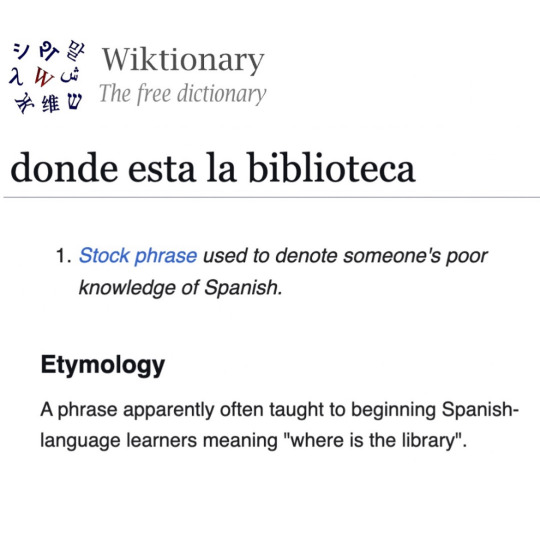
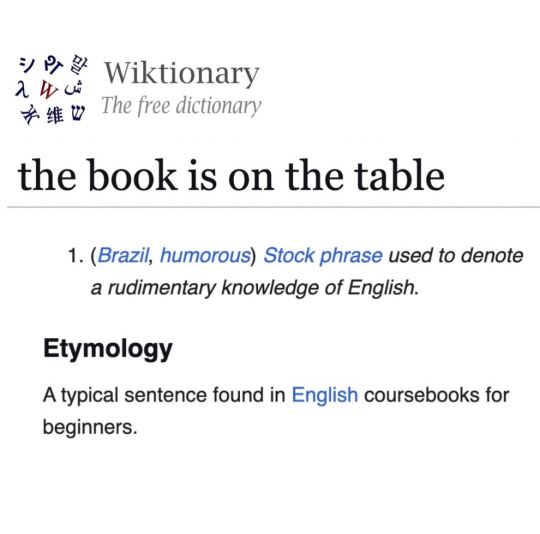
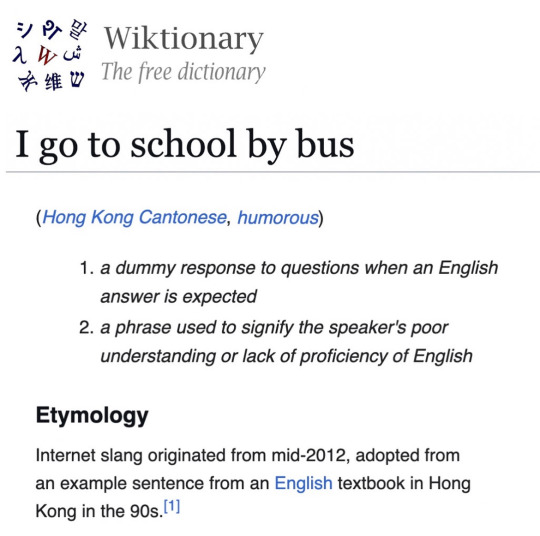
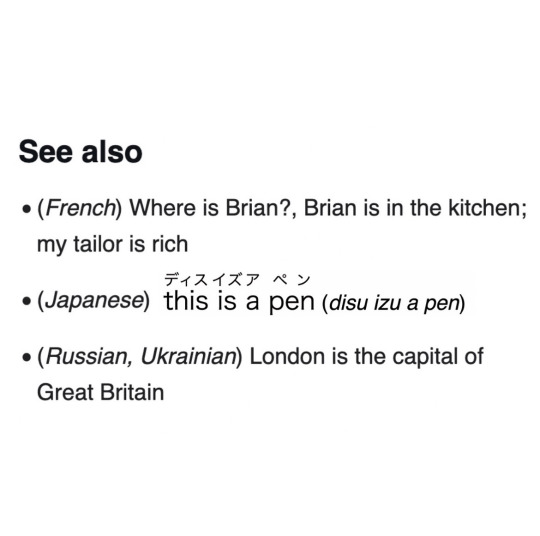
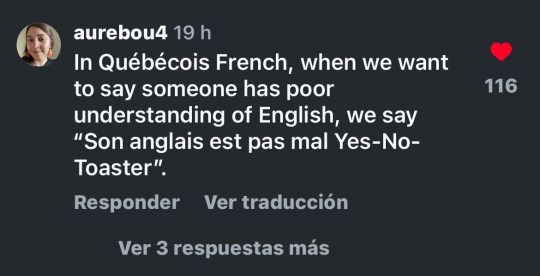
i’m obsessed with these…
(From DepthOfWikipedia on Instagram)
12K notes
·
View notes
Text
fact: when pidgin dialects involve english, -glish becomes the suffix, eg: chinglish, konglish, hinglish fact: slash pair name order puts the top first and the bottom second, eg: deancas vs casdean conclusion: english is an uke language and that’s why we have an omegaverse, not an alphaverse
#fandom#language#linguistics#shitposting#I posted this to bluesky first but it deserves a wider audience because I'm Right goddamit#omegaverse
8K notes
·
View notes
Text
the ladies call me the subjunctive mood the way I express desire, wishes, uncertainty, doubt and fear
6K notes
·
View notes
Text
33 notes
·
View notes
Text
Theres moreeee, this is so so good.. it makes me emotional realizing that these kids are on the path to being fluent cherokee speakers and will be able to keep the language going.
This family is a part of the little cherokee seeds program, creating new first language Cherokee speakers by paying mothers to just bring their babies and craft and cook and speak cherokee with cherokee elders all day. There are only 1500 first language Cherokee speakers, most of them over 65. They also take donations if you want to help keep them going and doing the extremely important work they do!!

#this was posted half an hour ago. i go on tiktok solely to check out her stuff now#cherokee#ndn#language#linguistics#native american#the first one is blowing up and this one might not but im still putting the info actually in the post this time#the baby going 'ni! ni!' 😭😭😭#[ni means 'look!']
12K notes
·
View notes
Text
AuDHD is so funny sometimes like what do you mean my hyperfixations/special interests will last for years on end or possibly forever but they will cycle out every month or two with absolutely no transitional period or warning. like i will think about the same topic every day obsessively for 46 days in a row and on the 47th day with no visible cause adhd brain goes "ok! bored of that now" and autism brain goes "dw i got something queued up for ya" and i blast into full blown obsession on some other topic whose mental file folders haven't opened in 9 months. brain's out here treating hyperfixations like a crop rotation. once the dopamine runs out it cycles in another one but once something's in the rotation it never ever leaves. last summer we brought in one from when i was 11. it's so funny to me but frustrating too bc like. i cannot stress enough my inability to predict or control this. or how completely abrupt and random it can be
#actually adhd#actually autistic#audhd#aphelion.txt#ik 'adhd brain' vs 'autism brain' is a gross oversimplification especially given how much overlap there can be#but it at least helps me conceptualize wtf is going on in my head when i do this lol#and yeah i'm mostly referring to fandoms in this post but it can happen w more 'Traditional' special interests too#like my linguistics special interest which hasn't popped up in a couple years now but whenever it does#i will fill literal notebooks while studying 4 languages at once and simultaneously inventing a conlang#and then i'll be like Ok that was fun! and several months later im deleting like. 2gb of textbooks off my iphone to make room for an update#And sometimes yeah there is a precipitating event like 'Oh something new happened in X fandom with my blorbo!' but sometimes it's like#yeah. no. idk either. switch got flipped in my brain and X no longer sparks joy. only Y rn. how come it's Y? yeah idk i also wish i knew#i don't think any of this is actually an uncommon experience for people with these types of neurodivergencies it's just.#the severity of abruptness and TOTALITY of the switch that makes me feel like a weirdo sometimes lol#like I'M getting mental whiplash from this sometimes. idk how y'all are still following my blog
7K notes
·
View notes
Text
🪄 lingwizard Follow
Magilinguistics and magiconlinguistics are so underrated. The idea that the specific language and syntax used to cast a spell can alter the efficiency and flow of a spell is amazing; it’s honestly infuriating how many people, including many mages, think Latin is the only valid conjuring language even though glossolalia is a WELL-DOCUMENTED PHENOMENON. I use many other languages in various spells and it’s really fun. Would recommend.
🪶 featherspells Follow
YOU CAN DO THAT? YOU CAN TRANSLATE LATIN SPELLS INTO A DIFFERENT LANGUAGE AND THEY’LL WORK!?! EVEN YOUR NATIVE LANGUAGE?!
🌱 gandalfbignaturals Follow
Yeah, welcome to the club! Using your native language isn’t recommended for summoning forces from other realms, though. The portals tend to collapse if you do that.
🗝️ keytomychest Follow
Wait wait wait, I just consulted my familiar about this, is magiconlinguistics modifying or inventing an entire language to optimize your magic? Because that sounds like something both extremely commendable and also batshit insane.
🌳 druid-ruin Follow
Yeah, that’s basically exactly what it is. We’re surprisingly pretty chill. I mean, except for that one time where someone hyper-optimized Taikureiden Suomen Kieli V5 to create the first, and most dangerous, known instance of the Everything-Damage Fireball spell, but we usually don’t talk about that.
🪄 lingwizard Follow
Ah, Taikureiden Suomen Kieli, the most absolutely broken magilang to ever exist. Go Finland, give us more fucked-up spells!
🪶 featherspells Follow
wait, the Everything-Damage Fireball is REAL? I thought you guys were joking.
🌳 druid-ruin Follow
We WERE joking. ONCE.
🔥 icastfireball Follow
on one hand, this is really cool and all, but on the other hand, i'm scared of what this can do. However, on the secret third hand, i kinda wanna modify a language to make demonic creatures physically sick upon hearing it, cause i wanna do a little trolling.
🪄 lingwizard Follow
Grand Mage Amara Lightningchain coming up with the idea for the Volapük Silananazunik experiments be like:
🔥 icastfireball Follow
hold on let me look something up
🔥 icastfireball Follow
wh. what the fuck
#linguistics#wizardposting#fake posts#fake post#dashboard simulator#first time making one of these so go easy on me
9K notes
·
View notes
Text
in pronouns class
#wish I was kidding#we're talking about “she” and “her” and “they” and “them”#and why there's differences in where they can be used#(its. because “she” and “they” are genitive but “her” and “them” are accusative nouns)#((I will be failing pronouns class))#linguistics posting
2 notes
·
View notes